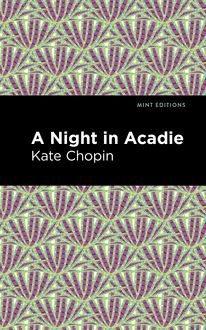-
 Univers
Univers
-
 Ebooks
Ebooks
-
 Livres audio
Livres audio
-
 Presse
Presse
-
 Podcasts
Podcasts
-
 BD
BD
-
 Documents
Documents
-
- Cours
- Révisions
- Ressources pédagogiques
- Sciences de l’éducation
- Manuels scolaires
- Langues
- Travaux de classe
- Annales de BEP
- Etudes supérieures
- Maternelle et primaire
- Fiches de lecture
- Orientation scolaire
- Méthodologie
- Corrigés de devoir
- Annales d’examens et concours
- Annales du bac
- Annales du brevet
- Rapports de stage
La lecture à portée de main
Vous pourrez modifier la taille du texte de cet ouvrage
Découvre YouScribe en t'inscrivant gratuitement
Je m'inscrisDécouvre YouScribe en t'inscrivant gratuitement
Je m'inscrisEn savoir plus
Vous pourrez modifier la taille du texte de cet ouvrage
En savoir plus

Description
A Night in Acadie (1897) is a short story collection by American author Kate Chopin. Chopin, a pioneering feminist and gifted writer, sought to portray the experiences of Southern women and ethnic minorities struggling to survive in an era decimated by war and economic hardship. A Night in Acadie collects twenty-one of her stories.
In “A Night in Acadie,” a young farmer named Telèsphore decides to take his meager earnings with him into town. Making his way to the train, he laments his solitary life, musing on the women he has unsuccessfully courted—the lovely Elvina, homely and hardworking Amaranthe, and the seductive widow Ganache. That night, attending a dance near Marksville, he makes the acquaintance of the beautiful Zaïda. Although she is already engaged to be married, he makes a point of talking to her, happy to escape his thoughts, if only for one night. “Athénaïse” is the story of a young wife who longs to escape her husband. Fleeing to New Orleans, determined to survive on her own, Athénaïse soon makes a discovery that shakes her conviction and forces her to consider returning home. In “Regret,” Mamzelle Aurélie is an unmarried woman approaching middle age. Having never been in love, she lives comfortably with her dog on a modest farm. One day, her neighbor unexpectedly shows up at her doorstep with her four young children, asking if she will look after them for the day. A Night in Acadie showcases the literary talent of Kate Chopin, a writer with an eye for characters on the fringe, people whose hearts often clash with the rules and demands of culture in the American South.
With a beautifully designed cover and professionally typeset manuscript, this edition of Kate Chopin’s A Night in Acadie is a classic of American literature reimagined for modern readers.
Sujets
Informations
| Publié par | Mint Editions |
| Date de parution | 23 février 2021 |
| Nombre de lectures | 0 |
| EAN13 | 9781513276618 |
| Langue | English |
| Poids de l'ouvrage | 3 Mo |
Informations légales : prix de location à la page 0,0500€. Cette information est donnée uniquement à titre indicatif conformément à la législation en vigueur.
Extrait
A Night in Acadie
Kate Chopin
A Night in Acadie was first published in 1897.
This edition published by Mint Editions 2021.
ISBN 9781513271613 | E-ISBN 9781513276618
Published by Mint Editions®
minteditionbooks.com
Publishing Director: Jennifer Newens
Design & Production: Rachel Lopez Metzger
Project Manager: Micaela Clark
Typesetting: Westchester Publishing Services
C ONTENTS I. A N IGHT IN A CADIE II. A THÉNAÏSE III. A FTER THE W INTER IV. P OLYDORE V. R EGRET VI. A M ATTER OF P REJUDICE VII. C ALINE VIII. A D RESDEN L ADY IN D IXIE IX. N ÉG C RÉOL X. T HE L ILIES XI. A ZÉLIE XII. M AMOUCHE XIII. A S ENTIMENTAL S OUL XIV. D EAD M EN ’ S S HOES XV. A T C HENIÈRE C AMINADA XVI. O DALIE M ISSES M ASS XVII. C AVANELLE XVIII. T ANTE C AT ’ RINETTE XIX. A R ESPECTABLE W OMAN XX. R IPE F IGS XXI. O ZÈME ’ S H OLIDAY
I
A N IGHT IN A CADIE
There was nothing to do on the plantation so Tel è sphore, having a few dollars in his pocket, thought he would go down and spend Sunday in the vicinity of Marksville.
There was really nothing more to do in the vicinity of Marksville than in the neighborhood of his own small farm; but Elvina would not be down there, nor Amaranthe, nor any of Ma’me Valtour’s daughters to harass him with doubt, to torture him with indecision, to turn his very soul into a weather-cock for love’s fair winds to play with.
Tel è sphore at twenty-eight had long felt the need of a wife. His home without one was like an empty temple in which there is no altar, no offering. So keenly did he realize the necessity that a dozen times at least during the past year he had been on the point of proposing marriage to almost as many different young women of the neighborhood. Therein lay the difficulty, the trouble which Tel è sphore experienced in making up his mind. Elvina’s eyes were beautiful and had often tempted him to the verge of a declaration. But her skin was over swarthy for a wife; and her movements were slow and heavy; he doubted she had Indian blood, and we all know what Indian blood is for treachery. Amaranthe presented in her person none of these obstacles to matrimony. If her eyes were not so handsome as Elvina’s, her skin was fine, and being slender to a fault, she moved swiftly about her household affairs, or when she walked the country lanes in going to church or to the store. Tel è sphore had once reached the point of believing that Amaranthe would make him an excellent wife. He had even started out one day with the intention of declaring himself, when, as the god of chance would have it, Ma’me Valtour espied him passing in the road and enticed him to enter and partake of coffee and “baign é s.” He would have been a man of stone to have resisted, or to have remained insensible to the charms and accomplishments of the Valtour girls. Finally there was Ganache’s widow, seductive rather than handsome, with a good bit of property in her own right. While Tel è sphore was considering his chances of happiness or even success with Ganache’s widow, she married a younger man.
From these embarrassing conditions, Tel è sphore sometimes felt himself forced to escape; to change his environment for a day or two and thereby gain a few new insights by shifting his point of view.
It was Saturday morning that he decided to spend Sunday in the vicinity of Marksville, and the same afternoon found him waiting at the country station for the south-bound train.
He was a robust young fellow with good, strong features and a somewhat determined expression—despite his vacillations in the choice of a wife. He was dressed rather carefully in navy-blue “store clothes” that fitted well because anything would have fitted Tel è sphore. He had been freshly shaved and trimmed and carried an umbrella. He wore—a little tilted over one eye—a straw hat in preference to the conventional gray felt; for no other reason than that his uncle Tel è sphore would have worn a felt, and a battered one at that. His whole conduct of life had been planned on lines in direct contradistinction to those of his uncle Tel è sphore, whom he was thought in early youth to greatly resemble. The elder Tel è sphore could not read nor write, therefore the younger had made it the object of his existence to acquire these accomplishments. The uncle pursued the avocations of hunting, fishing and moss-picking; employments which the nephew held in detestation. And as for carrying an umbrella, “Nonc” Tel è sphore would have walked the length of the parish in a deluge before he would have so much as thought of one. In short, Tel è sphore, by advisedly shaping his course in direct opposition to that of his uncle, managed to lead a rather orderly, industrious, and respectable existence.
It was a little warm for April but the car was not uncomfortably crowded and Tel è sphore was fortunate enough to secure the last available window-seat on the shady side. He was not too familiar with railway travel, his expeditions being usually made on horse-back or in a buggy, and the short trip promised to interest him.
There was no one present whom he knew well enough to speak to: the district attorney, whom he knew by sight, a French priest from Natchitoches and a few faces that were familiar only because they were native.
But he did not greatly care to speak to anyone. There was a fair stand of cotton and corn in the fields and Tel è sphore gathered satisfaction in silent contemplation of the crops, comparing them with his own.
It was toward the close of his journey that a young girl boarded the train. There had been girls getting on and off at intervals and it was perhaps because of the bustle attending her arrival that this one attracted Tel è sphore’s attention.
She called good-bye to her father from the platform and waved good-bye to him through the dusty, sun-lit window pane after entering, for she was compelled to seat herself on the sunny side. She seemed inwardly excited and preoccupied save for the attention which she lavished upon a large parcel that she carried religiously and laid reverentially down upon the seat before her.
She was neither tall nor short, nor stout nor slender; nor was she beautiful, nor was she plain. She wore a figured lawn, cut a little low in the back, that exposed a round, soft nuque with a few little clinging circlets of soft, brown hair. Her hat was of white straw, cocked up on the side with a bunch of pansies, and she wore gray lisle-thread gloves. The girl seemed very warm and kept mopping her face. She vainly sought her fan, then she fanned herself with her handkerchief, and finally made an attempt to open the window. She might as well have tried to move the banks of Red river.
Tel è sphore had been unconsciously watching her the whole time and perceiving her straight he arose and went to her assistance. But the window could not be opened. When he had grown red in the face and wasted an amount of energy that would have driven the plow for a day, he offered her his seat on the shady side. She demurred—there would be no room for the bundle. He suggested that the bundle be left where it was and agreed to assist her in keeping an eye upon it. She accepted Tel è sphore’s place at the shady window and he seated himself beside her.
He wondered if she would speak to him. He feared she might have mistaken him for a Western drummer, in which event he knew that she would not; for the women of the country caution their daughters against speaking to strangers on the trains. But the girl was not one to mistake an Acadian farmer for a Western traveling man. She was not born in Avoyelles parish for nothing.
“I wouldn’ want anything to happen to it,” she said.
“It’s all right w’ere it is,” he assured her, following the direction of her glance, that was fastened upon the bundle.
“The las’ time I came over to Foch é ’s ball I got caught in the rain on my way up to my cousin’s house, an’ my dress! J’ vous r é ponds! it was a sight. Li’le mo’, I would miss the ball. As it was, the dress looked like I’d wo’ it weeks without doin’-up.”
“No fear of rain to-day,” he reassured her, glancing out at the sky, “but you can have my umbrella if it does rain; you jus’ as well take it as not.”
“Oh, no! I wrap’ the dress roun’ in toile-cir é e this time. You goin’ to Foch é ’s ball? Didn’ I meet you once yonda on Bayou Derbanne? Looks like I know yo’ face. You mus’ come f’om Natchitoches pa’ish.”
“My cousins, the F é deau family, live yonda. Me, I live on my own place in Rapides since ’92.”
He wondered if she would follow up her inquiry relative to Foch é ’s ball. If she did, he was ready with an answer, for he had decided to go to the ball. But her thoughts evidently wandered from the subject and were occupied with matters that did not concern him, for she turned away and gazed silently out of the window.
It was not a village; it was not even a hamlet at which they descended. The station was set down upon the edge of a cotton field. Near at hand was the post office and store; there was a section house; there were a few cabins at wide intervals, and one in the distance the girl informed him was the home of her cousin, Jules Trodon. There lay a good bit of road before them and she did not hesitate to accept Tel è sphore’s offer to bear her bundle on the way.
She carried herself boldly and stepped out freely and easily, like a negress. There was an absence of reserve in her manner; yet there was no lack of womanliness. She had the air of a young person accustomed to decide for herself and for those about her.
“You said yo’ name was F é deau?” she asked, looking squarely at Tel è sphore. Her eyes were penetrating—not sharply penetrating, but earnest and dark, and a little searching. He noticed that they were handsome eyes; not so large as Elvina’s, but finer in their expression. They started to walk down the track before turning into the lane leading to Trodon’s house. The sun was sinking and the air was fresh and invigorating
-
 Univers
Univers
-
 Ebooks
Ebooks
-
 Livres audio
Livres audio
-
 Presse
Presse
-
 Podcasts
Podcasts
-
 BD
BD
-
 Documents
Documents
-
Jeunesse
-
Littérature
-
Ressources professionnelles
-
Santé et bien-être
-
Savoirs
-
Education
-
Loisirs et hobbies
-
Art, musique et cinéma
-
Actualité et débat de société
-
Jeunesse
-
Littérature
-
Ressources professionnelles
-
Santé et bien-être
-
Savoirs
-
Education
-
Loisirs et hobbies
-
Art, musique et cinéma
-
Actualité et débat de société
-
Actualités
-
Lifestyle
-
Presse jeunesse
-
Presse professionnelle
-
Pratique
-
Presse sportive
-
Presse internationale
-
Culture & Médias
-
Action et Aventures
-
Science-fiction et Fantasy
-
Société
-
Jeunesse
-
Littérature
-
Ressources professionnelles
-
Santé et bien-être
-
Savoirs
-
Education
-
Loisirs et hobbies
-
Art, musique et cinéma
-
Actualité et débat de société
- Cours
- Révisions
- Ressources pédagogiques
- Sciences de l’éducation
- Manuels scolaires
- Langues
- Travaux de classe
- Annales de BEP
- Etudes supérieures
- Maternelle et primaire
- Fiches de lecture
- Orientation scolaire
- Méthodologie
- Corrigés de devoir
- Annales d’examens et concours
- Annales du bac
- Annales du brevet
- Rapports de stage



















